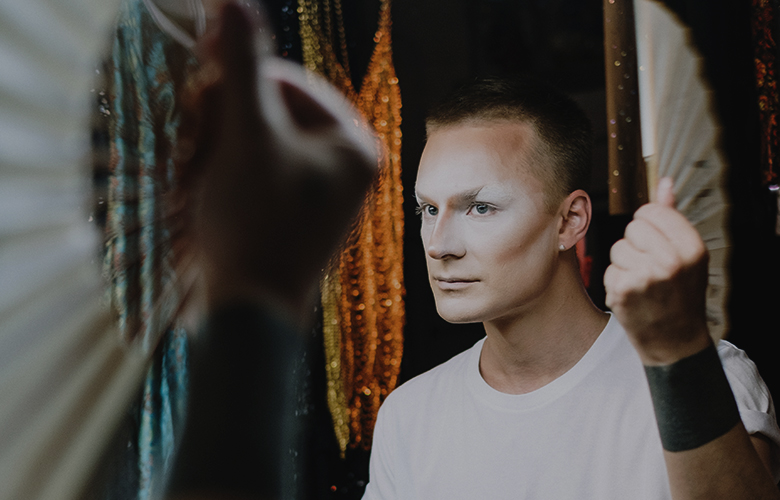
Covid19 brought drastic changes to the curriculum of European theater academies. The physical component, so essential for the performing arts, was eliminated. What can replace the profound presence of a physical performance? More emphasis on language? Solo performances? The integration of masks in some shape or form? Or a stronger presence of the virtual world?
Here are some thoughts from European theater academy professionals in Austria, Switzerland, and Germany, where new Covid19 regulations are strictly followed to protect students, teachers, and audiences alike.
In Munich’s August Everding theater academy, Covid19 hit just as the students had begun rehearsing their diploma performances. Everything was shut down from one moment to the next. Distancing rules were established.
As a direct result, the final productions of the school year became impossible to perform in the way they had been intended.
What followed was a logistical tour-de-force. Director Marcel Kohler guided his students as they moved from the physical stage to the Internet. They rehearsed at home in isolation and communicated with each other via Zoom calls. In the end, even through these limited means, they created an amazing online production.
It showed a tempo and joy of performing which reminded of Comedia dell’arte and was called, ‘We Made It Through Once More’, based on a drama by Thornton Wilder.
Holger Zebu Kluth, principal at the Ernst Busch acting academy in Berlin says, “An acting education can’t really be done entirely online. Performing in front of a webcam transports the acting out of the body into our heads. Whereas, under normal conditions, we try to achieve exactly the opposite.”
“This makes online acting classes almost counterproductive.”
Frank Schubert, professor at the Academy of the Arts in Bern, Switzerland, explains, “An important part of the basic education of a performer is the training towards ensemble competence. But this is impossible when working solo at home, as part of an entirely virtual ensemble with no physical contact.”
Maria Happel, actress at the Burgtheater and newly elected principal at the Max Reinhardt Seminar in Vienna, thinks differently. “Theater means opening a space for dreams. We can create an empty room together to build on. This is at the heart of our profession. And we are able to do this even if each person in the ensemble is located somewhere else.”
Here is the integral question though: How much collaboration, how much togetherness can we achieve while being forced to physically distance ourselves from each other?
Lorenz Nolting, who currently does his masters in directing at Hamburg’s theater academy, explains, “In Hamburg, the authorities are trying to avoid what we call zero-semesters (open semesters during which students can take initiative and realize their own projects). However, other German cities, Leipzig for example, grant students a creative semester. The students can take voluntary speech and movement classes in the park. And they can realize projects such as their own radio show, etc.”
”However, the main problem for this year’s seniors is that they have no visibility. Normally, students have the opportunity to be noticed outside the academy as they publicly perform their diploma productions.”
”Now, there are not enough chances for interactions with the world outside the academy.”
Holger Zebu Kluth from the Ernst Busch Academy is worried. “We need to address the fear of our students of becoming a ‘lost year.’ However, I don’t think it will be practical to include them in the design of a framework for this state of exception. Because Covid19-response rules are not really up for discussion.”
”For our daily rehearsals, the Covid19 rules mean: 1 1/2 meter distance to each other at any time. And, for the actual performances, we are calculating 20 square meters per person.”
From Bern, Frank Schubert reports, “We have plexiglas between us at all times as well as max 4 students per room.”
“There are no formal presentations. Instead, everything is recorded on camera and afterwards graded on screen. Even diploma performances.”
In Vienna, Maria Happel says: “One of the first measures we took was to build a stage in the park. This helped to create more physical space as well as creative freedom. Additionally, we are conducting ensemble classes and body awareness classes in the garden. Also, we have built solo parkours areas for acrobatics classes.”
Frank Schubert in Bern thinks, “Language touches us. Now, most likely, language education will win. As will imagination. Completely new ideas will develop.”
Maria Happel is excited, “I am curious to see if there will be many performances with Commedia dell’arte masks or maybe even antique masks to combine the artistic with the necessary. How will we deal with all this? We don’t want to play only 2-performer pieces.
The digital approach has shown us new paths to consider. Or maybe, theater will go back to performing in market squares.
Lorenz Nolting is sure, “Just as the means of expression will adjust to new conditions, so will the struggle for visibility.”
“The search for new channels online as well as offline will intensify. There is an urge and also a curiosity to think of new Covid19-adaptable formats within the student body. The general consensus is to get creative and work hard towards new solutions.”
”I am currently developing a street performance format where two actors will perform on the roof of a car. Over time, I hope the academies will increasingly take the ideas of their students onboard as they adjust their institutional organizations.”
“The search for their own channels will become essential for acting students,” says Holger Zebu Kluth as he ponders the future of his students in Berlin.
“They will need to find alternatives to the currently closed paths in the entertainment industry.”
“Instead of live entertainment, many seniors are currently looking more towards the film industry,” Maria Happel observes.
In response to this, Lorenz Nolting points out emphatically, “We study theater, not film. To stage a play means ‘to be together in one room’ and it is this common, collaborative space from which the imagination, the dreaming of theater, flows.”
To which Maria Happel adds, thoughtfully, “He who loses his dreams, loses his mind.”
(Based on Internet research and on the article “Theater Träumen”, by Sophie Diesselhorst, Elena Philipp, and Christian Rakow, on nachtkritik.de)
The Importance of Kindness in Entertainment


Liam Klenk was born in Central Europe and has since lived on four continents. Liam has always been engaged in creative pursuits, ranging from photography and graphic design, to writing short stories and poetry, to working in theatre and shows. In 2016, Liam published his first book and memoir, 'Paralian'.
Read Full Profile© 2021 TheatreArtLife. All rights reserved.

Thank you so much for reading, but you have now reached your free article limit for this month.
Our contributors are currently writing more articles for you to enjoy.
To keep reading, all you have to do is become a subscriber and then you can read unlimited articles anytime.
Your investment will help us continue to ignite connections across the globe in live entertainment and build this community for industry professionals.